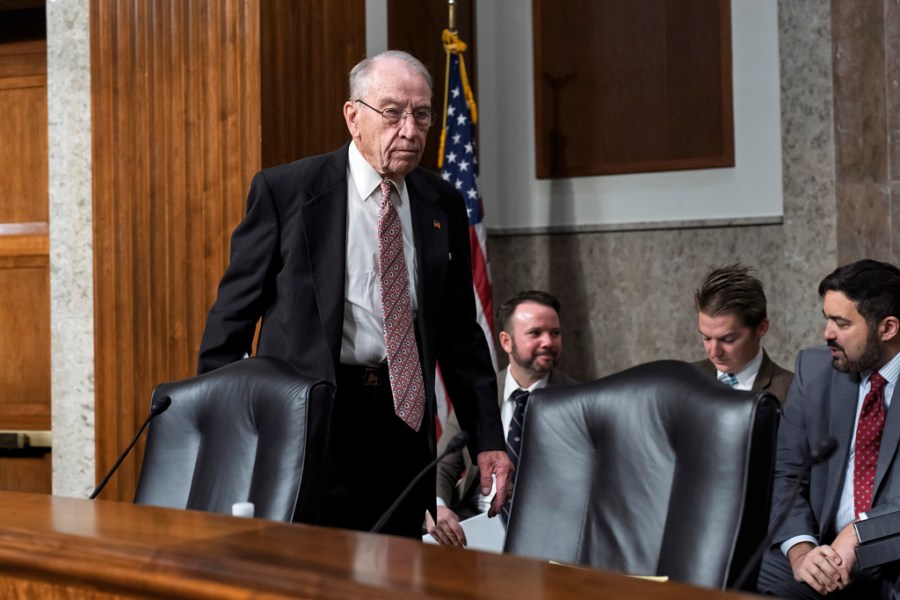
Rep. Mike Johnson (R-La.) failing to win the speakership vote Friday raises the possibility the post will remain unfilled before Inauguration Day. In that scenario, Sen. Chuck Grassley (R-Iowa) could become the acting president. The election of the new Speaker could be as painful for the GOP as was Johnson’s recent election, which spanned 15 rounds of voting over 18 days.
Eighteen days the GOP doesn’t have, because the House can neither function nor certify the 2024 election without a Speaker. What the Jan. 6, 2021 rioters could not accomplish, GOP disfunction could: Without a successful Speaker vote in the House, President-elect Trump’s and Vice President-elect Vance’s positions would remain unratified, and they would be ineligible to be sworn in.
If the House can’t elect a Speaker by Jan. 20, the constitutionally-prescribed Inauguration Day, then the new GOP-controlled Senate’s president pro-tempore (pro-tem), Grassley, would be inaugurated as the United States’ 47th president. Congress, as empowered by the amended Constitution, set the line of succession in the absence of a president or vice president to be the Speaker of the House (vacant), then the Senate pro-tem (Grassley).
But who would be next in line? Who would be the president if President Grassley, age 91, were to be suddenly unable to serve, or, God forbid, to pass on before the Senate confirmed any Cabinet secretaries. Well . . . no one. Or, rather, absolutely anyone the Senate felt like making president.
If we needed to suddenly replace new President Grassley, the country would be in the exact same position as what put President Grassley in office — no Speaker of the House to take their place in the line of succession, and no certified 2024 election, meaning Trump and Vance would remain private citizens.
The Senate pro-tem would again become the next president. Whatever else the Senate might be, it is and always has been a staunchly traditionalist institution, and the Senate’s tradition is to elect the longest-tenured senator of the majority party Senate pro-tem. After Grassley, next in line is who else but Sen. Mitch McConnell (R-Ky.).
Yes, that Mitch McConnell, the 18-year, Senate Republican leader who will remain arguably the second most powerful senator in this next Congress while serving as the chair of both the Senate Rules Committee and the Defense Appropriations Subcommittee. That Mitch McConnell, who’s spent decades building favors and chasing power (and knowing what to do with it) and would presumably see a surprise presidency as the ultimate cherry on top of a very successful career.
However, the U.S. Constitution gives the Senate complete discretion to select a Senate pro-tem, declaring simply “The Senate shall choose their other officers, and also a President pro tempore.” Just like Sen. Rand Paul (R-Ky.) recently floated electing Elon Musk as Speaker of the House, anyone — literally anyone — can serve as the Senate pro-tem. While the breadth of this flexibility has never been tested in court, former Supreme Court Justice Joseph Story wrote that the benefits of allowing the Senate this discretion was “so obvious, that it is wholly unnecessary to vindicate it.”
So in the (unlikely but distressingly-plausible) situation where we would need a successor to President Grassley, the Senate would have unfettered discretion to pick our next president. At that point, a 35-year-old, natural-born American citizen who could get 51 senators to vote for them would be our next president.
Maybe the Senate would defer to the American peoples’ recently expressed will and choose President-elect Trump, bypassing the House’s dysfunction. (Though most would never say so, it would be no small pleasure for most senators to rub a little salt in the lower house’s self-inflicted wounds.)
Or maybe the Senate GOP, many of whom (quietly) resent Trump’s power, elect Vice President-elect Vance in his stead, elevating one of their own. Maybe they see this as an opportunity to strengthen their preferred 2028 candidate, and select Sen. Tim Scott (R-S.C.) or Marco Rubio (R-Fla.) or Josh Hawley (R-Mo.). Maybe they elevate an outsider, perhaps a former governor with national profile (Doug Burgum of North Dakota) or cross-ballot appeal (former Maryland Gov. Larry Hogan). Hard as it would be to imagine, even a Democrat would be a possibility, as only four GOP defections would be sufficient to elect President Chuck Schumer.
Of course, is any of this likely to come to pass? Absolutely not. But it is absolutely plausible? Yes, unfortunately, and it grows likelier the longer the drama surrounding the Speaker of the House drags on. The very fact that House GOP dysfunction is lending credence to these convoluted constitutional “what-ifs,” that it’s leaving open the very basic, very important question of “who will be the leader of the free world in three weeks,” and that it’s imperiling the basic functionality of our federal government just goes to show how far we’ve fallen.
Brendan Bargmann is a former senior Democratic fundraiser and a current commercial bankruptcy attorney.












